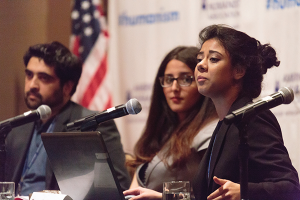Islam’s Ex Factor: An Interview with Sarah Haider and Muhammad Syed

THEIR LOGO IS AN ‘X’ formed by the mirror image of two crescent moons. They are the Ex-Muslims of North America, at once a negation and a commitment to something more: the promotion of secular and humanistic values. Based in Washington, DC, but with support groups in at least eighteen cities, Ex-Muslims of North America aims to make apostasy—the renunciation of faith—a safe and legitimate step for Muslims. I caught up with EXMNA co-founders Sarah Haider and Muhammad Syed shortly after they presented at the American Humanist Association’s 75th Annual Conference, held May 26-29 in Chicago.
Clay Farris Naff: Sarah, let me start with you. You’re an ex- Muslim, but tell me a little bit about your experience as a Muslim.
Sarah Haider: I grew up in Texas, so I was introduced to a lot of conservative religious viewpoints, both Christian and Muslim. We were Shi’a [a branch of Islam], so we were a minority within a minority there. My upbringing was pretty moderate and pretty secular compared with most Muslims. I started questioning religion at the age of sixteen and never looked back. Everything just fell away pretty quickly.
Naff: Has your family accepted your decision?
Haider: They’ve come to terms with it. It’s not something they’re happy about. The decision is something I started talking about pretty soon after I started questioning. So they knew what was coming, but they thought it was a phase. Now, ten years later, it’s clearly not a phase. I’m very vocal and open about it. That last part is the most divisive issue in my family: my talking about my apostasy and spreading secular values and a humanist way of being.

Muhammad Syed (left), Mya Saleem (center), and Sarah Haider (right) participate in the May 27, 2016, panel “Examining Honor Culture & Violence in Islam” at the annual conference of the American Humanist Association.
Naff: Muhammad, you bear the name of the prophet, so any Muslim that you meet must assume that you’re a fellow Muslim. Tell me about your own transition to being an ex-Muslim.
Muhammad Syed: I personally draw great amusement from the fact that my name offends some people. I use the nickname “Mo the Atheist” or “Muhammad the Atheist,” which not very many Muslims are happy about. Regarding my background, I grew up in Pakistan, which is generally a conservative environment. There’s no concept of atheism, no concept of disbelief. So it doesn’t even occur to the average Pakistani that there’s an alternative.
My family is relatively pro-science. I was a Muslim who understood and accepted evolution. I understood how the universe works, and pointed out that Muslims who push against that are misinformed. They don’t understand it. They don’t understand Islam, and they’re doing a great disservice. We should push back against these conservatives who are maligning the image of Islam.
In my twenties I started investigating things in more detail because I wanted to understand Islam and to be able to advocate against conservatives to say that their perspective is wrong. I spent about six months reading scripture and secondary texts, and by the end of that I realized that they were actually right in their interpretation. None of it really made any sense. So that was the end of Islam for me.
Naff: And now you speak against it in forums like the American Humanist
Association conference. Even here I gather you both run into some resistance. You spoke of liberals who feel that criticizing Islam is an act of racism or something comparable. How much hostility do you encounter when you speak out, and what forms does it take?
Syed: A woman came up right after the talk and called me and one of the other panel members Islamophobes because we didn’t attack Christianity. The talk is about Islam. Imagine in another context we are talking about, say, American foreign policy and because we’re not talking about Russia, therefore we’re horribly … whatever. It doesn’t make any sense.
Haider: I have to say it’s better in forums like this than anywhere else. Humanists and atheists are the most likely to be receptive to what we’re saying, and to interpret it in the way that we intend. We want to promote secular values and criticism of Islam, but we don’t want that to come across as a justification for treating Muslims in a way you wouldn’t treat anybody else in the United States. We stand for civil liberties and want to protect Muslims from racism.
[Humanists] should understand that, but also you have to talk about the problems in Islam. If people like us don’t take up that mantle, we cede that ground to actual bigots. Then you give them credibility and strength. You give them the ability to become leaders on this issue, and that’s a scary thing.
Naff: Let’s talk about Islam itself. It’s a vast religion—in numbers almost comparable to Christianity and in diversity certainly comparable. Do you feel that Islam in all of its forms is repugnant, or is it only in certain ways that it is enacted that you find troubling?
Syed: If you look at the scripture, it is a seventh-century text. It reflects all the mores of the seventh century: violence against women, sex slavery, war, tribalism—all of these things. The central text is bad across the board.
Now you have people who are more liberal and can interpret it accordingly. You can’t judge Muslims by what’s in the text. In the text sex slavery is perfectly fine, but most Muslims are not okay with sex slavery or any form of slavery.
So, there’s a distinction to be drawn between what people believe and what their faith is. We should be criticizing the faith, but that doesn’t mean that all Muslims adhere to those bad ideas.
Haider: But some do. That’s something we should be talking about, and an issue that we should be considering very seriously. Still, many Muslims are good in spite of their religion. They interpret it in a way that is humane.
And there are good tenets of Islam. I would say charity is something that’s emphasized and mandated. So there are certain things you can draw from their religion that can work in modern society. But on the whole, there’s a lot that’s problematic.
Naff: Violence takes place within every major religion, but it’s certainly most noticed in Islam these days, and there’s certainly no question that violence is targeted against people who speak out against Islam. Have you felt personally threatened with violence? Do you feel you run a risk in doing this? And if so why do you do it?
Syed: That is part and parcel of it. People are attacked and murdered around the world for speaking up against Islam. But if you don’t speak up, how will things ever change? That is why, in my opinion, things are so bad—because for so long so few people have spoken up.
If you go back a few centuries, European Christianity and Islam were [practically] identical. Then a lot of brave Christian people started speaking up and demanding change for their faith. And that built into a movement [that became] the Enlightenment and changed everything. So we need to stand up and have the same courage.
We started speaking up roughly three years ago and in those three years we’ve seen more and more people start speaking up. We’ve seen groups forming in other countries, people starting to make YouTube videos, people writing books.
We’re at the beginning of an Enlightenment on the Eastern side. And hopefully we can be part of that. The more people who speak up the less danger there is in doing so. We’re trying to get more and more people to be outspoken. You can target a few people. You can’t target a movement.
